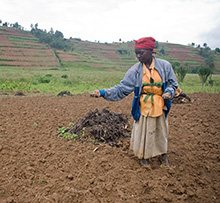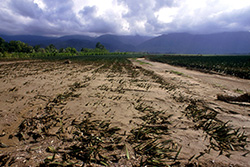Land, Water and Climate change
FAO supports member countries in adapting to climate change and in implementing the Paris Agreement and their nationally determined contributions. FAO works locally, nationally and internationally to increase technical capacities, promote awareness and establish enabling policy environments for action on climate change, including through the sustainable management of land, soils, water and ecosystem services.
Land management
 The relationship between land resources and climate change is complex and requires a coherent strategic response. Sustainable land management (SLM) is an important strategy for combating climate change, with the potential to also help reduce poverty and the loss of biodiversity, improve the management of water resources, increase food security and alleviate hunger.
The relationship between land resources and climate change is complex and requires a coherent strategic response. Sustainable land management (SLM) is an important strategy for combating climate change, with the potential to also help reduce poverty and the loss of biodiversity, improve the management of water resources, increase food security and alleviate hunger.
FAO and partners (such as those embodied in the FAO-hosted Global Soil Partnership) have developed and validated a wide range of guidelines, methodologies and practices on SLM and sustainable soil management. These tools show that it is possible to reduce greenhouse gas emissions and increase the resilience of agro-ecosystems and rural communities through the sustainable management of soil resources.
Soil organic matter
FAO seeks to improve soil health by ensuring adequate levels of soil organic matter (SOM) – the key soil property in stabilizing and improving soils for sustainable and climate-resilient land management. The amount and type of SOM are major determinants of soil carbon storage, which is an important component of the terrestrial carbon balance. SOM also provides habitat for soil organisms and helps maintain soil structure to ensure adequate aeration, root growth, soil water storage and filtering, and nutrient storage.
The following links explore the role of SOM and provide management options for maintaining and improving SOM:
- Status of the world’s soil resources
- Can SOC offset climate change?
- FAO Soil Portal
- Voluntary guidelines for sustainable soil management
- Global soil organic carbon mapping
Water management
 Climate change is altering hydrological regimes. Predictions show a general reduction in precipitation in semi-arid areas, an increase in precipitation in temperate zones, higher variability in rainfall distribution, an increase in the frequency of extreme events, and an increase in temperature. Reduced river base flows, increased flooding, and rising sea levels are projected to affect highly productive irrigated systems dependent on glacier melt and lowland deltas. In the semi-arid tropics, where droughts and floods are expected to increase, climate change is likely to especially affect the rural poor by reducing crop and livestock yields. Investments in water have played a crucial role in promoting socio-economic development in rural areas globally. The sustainable management of water resources is a prerequisite for development, reducing poverty and hunger, and mitigating and adapting to climate change. FAO is engaged in a range of initiatives and programmes to support member countries in mitigating and adapting to climate change through water management, including the following:
Climate change is altering hydrological regimes. Predictions show a general reduction in precipitation in semi-arid areas, an increase in precipitation in temperate zones, higher variability in rainfall distribution, an increase in the frequency of extreme events, and an increase in temperature. Reduced river base flows, increased flooding, and rising sea levels are projected to affect highly productive irrigated systems dependent on glacier melt and lowland deltas. In the semi-arid tropics, where droughts and floods are expected to increase, climate change is likely to especially affect the rural poor by reducing crop and livestock yields. Investments in water have played a crucial role in promoting socio-economic development in rural areas globally. The sustainable management of water resources is a prerequisite for development, reducing poverty and hunger, and mitigating and adapting to climate change. FAO is engaged in a range of initiatives and programmes to support member countries in mitigating and adapting to climate change through water management, including the following:
- Coping with water scarcity in agriculture: a global framework for action in a changing climate
- Drought risk management
- Irrigation management and modernization
- Water productivity
- Regional water scarcity initiative
- Water for the rural poor
Climate change and ecosystem services

Climate change is altering the temporal and spatial provision and functioning of ecosystem services. This has significant impacts on the resilience of vulnerable ecosystems and the well-being of communities reliant on the services those ecosystems provide. FAO uses an integrated, cross-sectoral approach to support smallholder farmers in moving towards more sustainable production practices, conserving natural resources, restoring degraded ecosystem services, and increasing resilience to climate change. FAO support also provides co-benefits for other users of ecosystem services at the local, national and global scales. Projects include:
